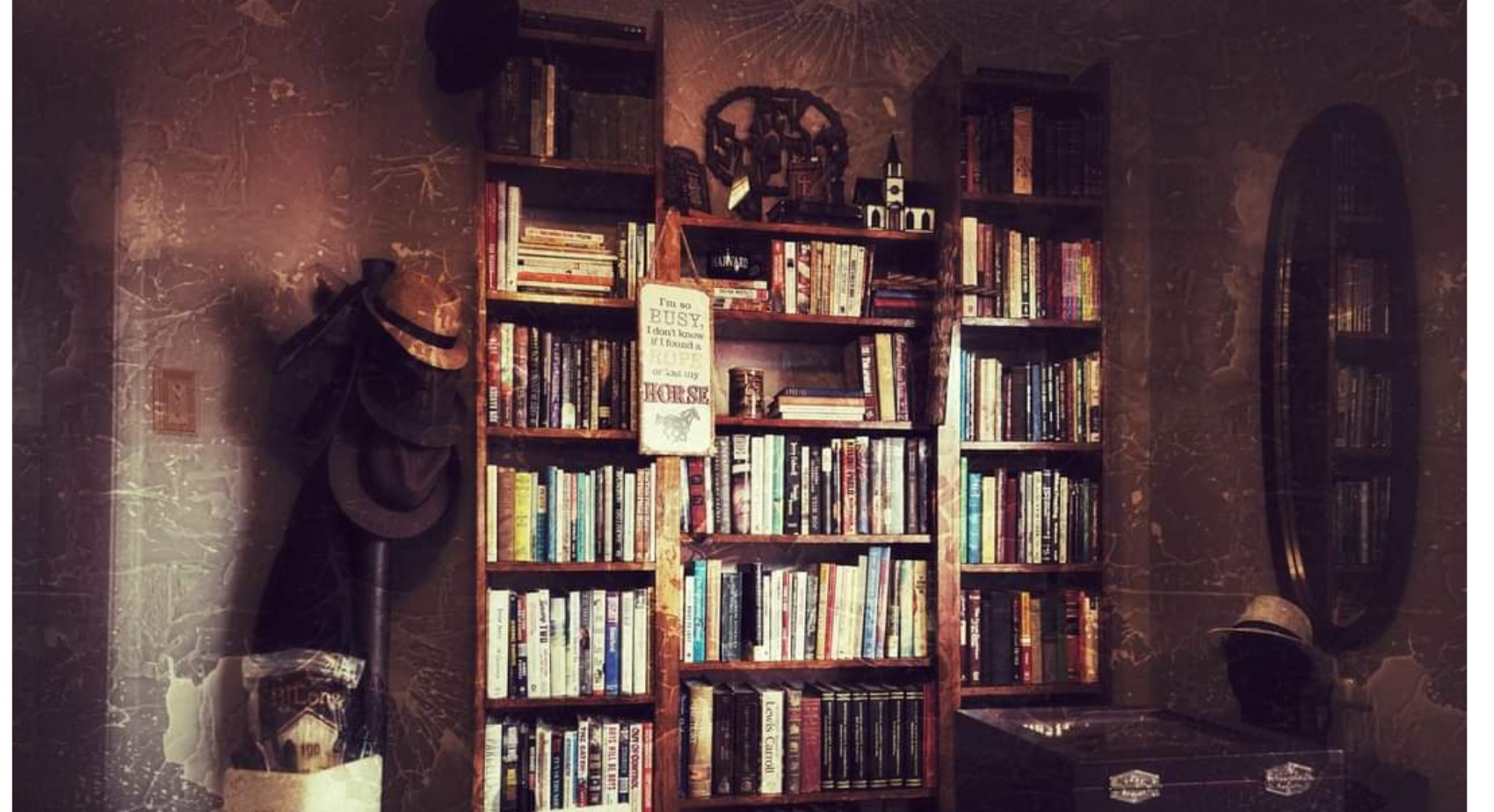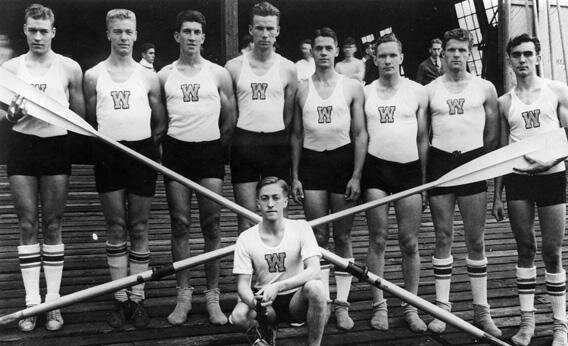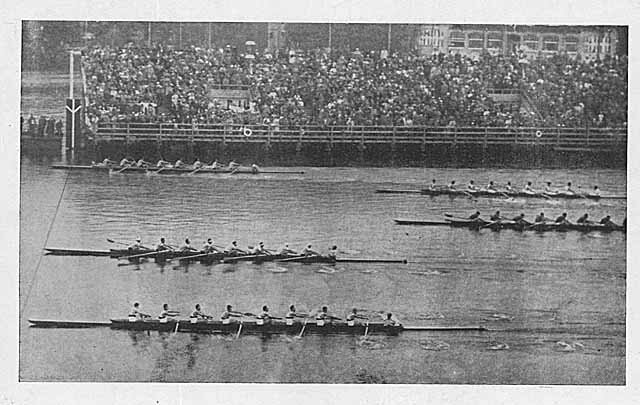“Physiologists, in fact, have calculated that rowing a two-thousand-meter race—the Olympic standard—takes the same physiological toll as playing two basketball games back-to-back. And it exacts that toll in about six minutes.”
If you are looking for a Summer read, a book with a real story, powerfully written on a topic you didn’t know you cared about, but really on the topic common to us all – that of human struggle, loss and redemption, and hope – pick up a copy of The Boys in the Boat by Daniel James Brown.
Did you know that rowing was the first athletic competition between two American colleges? It took place in 1852 between Harvard and Yale. Did you further know that few sports require the synchronic precision and power of a team, with zero room for error, like rowing? Or did you know that rowing uses essentially every muscle in the body and requires almost superhuman endurance?
The Intercollegiate Rowing Association held its first event in 1895 at Poughkeepsie. In 1929, as many as 125,000 people turned out to see the competition in person, and millions more tuned in to the hissy, scratchy radio signal to “witness” the event.
“The Regatta rivaled the Rose Bowl, the Kentucky Derby, and the World Series as a major national sporting event.”
Besides a well-told and remarkable story, The Boys in the Boat brims with life lessons, analogies for what it takes to succeed. I found myself listening for the nuggets of truth I could take with me to my work and to my personal journey.
You have to fight through the pain to win the prize.
“It’s not a question of whether you will hurt, or of how much you will hurt; it’s a question of what you will do, and how well you will do it, while pain has her wanton way with you.”
Everybody hurts. What separates the champion from the rest of the field is the ability to fight through the pain, to keep your focus when your entire being screams, “Quit! Ease up! I need a break!”
Once you begin yielding to the pain, it is a difficult trend to stop. Then, it becomes easy to develop a “poor me” mentality and assume the victors were carried to their achievements on beds of ease while no one else knows the troubles you’ve known.
Bitterness is a sugar pill.
“It takes energy to get angry. It eats you up inside. I can’t waste my energy like that and expect to get ahead.”
You don’t hear so much about “sugar pills” anymore, but back in the day (whatever that means), doctors would sometimes prescribe a pill to a patient whose ailment he believed to be psychosomatic. The pill contained no medicine but it made the patient “feel better” anyways.
Joe Rantz, the protagonist in Boys in the Boat, lost his mother when he was very young. Before he reached his teens, his father and stepmother abandoned him, and he essentially raised himself. He could have chosen bitterness and anger, and most would agree with him that he had every right to do just that. And where would that choice have left him? On skid row? Maybe an alcoholic or drug abuser? A man with an excuse? Less than a footnote in history?
One thing is sure: had he chosen bitterness and rage, he would have never worn an Olympic gold medal.
But anger can feel good. Rage releases certain internal chemicals that make us feel “good” for a few seconds. But the feeling is fleeting and the reward is failure.
Dr. Jean Kim has written a splendid article on the subject:
“There is also the psychological aspect of ego fragility and injury, often seen in narcissistic personalities; the rush behind anger can be triggered by underlying feelings of weakness or insecurity, a way to feel powerful in the moment and overcome those feelings. It also helps people feel briefly in control of things they typically have no control over. Unfortunately, the aftermath reinforces negative consequences that hurt you in the eyes of others, and continues the cycle of insecurity. It becomes a vicious cycle of tantrums and punishment that ultimately hurt the angry individual.”
It’s not just how hard you work; it’s how well you work and how well you work with others.
Hard work is better in the context of teamwork. You accomplish more. You enjoy it more because it is shared joy and shared joy is an exponential multiplier.
Joy is multiplied. Burdens are divided.
“Two are better than one; because they have a good reward for their labour.
For if they fall, the one will lift up his fellow: but woe to him that is alone when he falleth; for he hath not another to help him up.
Again, if two lie together, then they have heat: but how can one be warm alone?
And if one prevail against him, two shall withstand him; and a threefold cord is not quickly broken.”
Someone said, “Hard work is its own reward.” I cannot help but wonder if that was the person who worked his ass off and never succeeded because he worked hard but not smart. And he did it alone.
Flexibility is a sign of true strength.
“The ability to yield, to bend, to give way, to accommodate, he said, was sometimes a source of strength in men as well as in wood, so long as it was helmed by inner resolve and by principle.”
Since 2005, I have been in the Catastrophe business. I spent the first eight years working as an adjuster. I have seen the devastation caused by high winds and inflexible trees. Pine trees are notorious for their beauty and their size. They can grow to as high as 200 feet! But they are inflexible. Let a high-wind storm blow through some piney woods and those “mighty” trees snap like twigs. Only they are not twigs! They weigh thousands of pounds – in fact, the average weight of a full-grown Pine tree is 5,200 pounds – and when they crash into a structure, the results are, well, catastrophic.
In the 1999 – 2000 winter, we were living in east Texas – in the woods, the Piney Woods. A winter storm brought days and days of freezing rain and sleet. Ice built up on the Pines. They were beautiful to see, the massive icicles dangling from great branches on the trees that stretched to the heavens. But then, as the weight of the ice built up on their limbs, they began to snap. They took down power lines, interrupting our electrical service, turning our wood-framed home into a freeze box. I remember a dark winter’s night, the entire family huddled together in the living room under piles of blankets, listening to what sounded like a war in the woods. The trees were snapping and crashing, like bombs exploding all around us.
Palm trees, on the other hand, can reach heights of 70 feet and are found in more tropical regions, meaning they are often right in the path of the mother of storms, the Hurricane. How many times have you seen footage on the Weather channel of Palm trees bending under the force of massive winds until they are nearly horizontal, yet they don’t snap? They are strong enough to bend.
Can you be staunch in your principles, while accommodating the viewpoints of others? Can you yield the floor? Can you listen and accept when a better plan or idea is presented? Can you be wrong but not defensive?
The challenge is both your friend and your foe.
“It is hard to make that boat go as fast as you want to. The enemy, of course, is resistance of the water, as you have to displace the amount of water equal to the weight of men and equipment, but that very water is what supports you and that very enemy is your friend. So is life: the very problems you must overcome also support you and make you stronger in overcoming them.”
The very thing you must conquer is often the thing that supports you, that carries you, that comforts you. How does one get physically stronger? By working out, by lifting weights, by stressing muscles, pushing them to do more than they want to do. How does the mind expand? By focusing, digging in, working through difficult concepts, concentrating on hard problems.
Strain is the price of strength. Pain is the pathway to progress.
And the journey…the journey is just as important as the destination. Maybe more so…
“It was when he tried to talk about ‘the boat’ that his words began to falter and tears welled up in his eyes…Finally, watching Joe struggle for composure over and over, I realized that ‘the boat’ was something more than just the shell or its crew. To Joe, it encompassed but transcended both – it was something mysterious and almost beyond definition. It was a shared experience – a singular thing that had unfolded in a golden sliver of time long gone, when nine good-hearted young men strove together, pulled together as one, gave everything they had for one another, bound together forever by pride and respect and love. Joe was crying, at least in part, for the loss of that vanished moment but much more, I think, for the sheer beauty of it.”
Row! Row! Row your boat!



